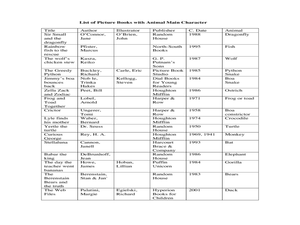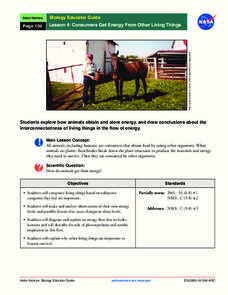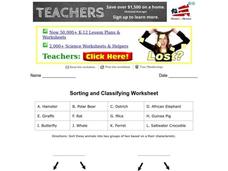Biology Junction
Introduction to Animals Crossword Puzzle
In this introduction to animals instructional activity, students complete a crossword puzzle with 47 questions on the types and characteristics of animals.
Curated OER
Find an Animal! Find a Book!
Students identify the themes of different books by classifying their genre. In this genre lesson, students examine a specific animal by reading both a nonfiction and fiction book about the species. Students compare the different books...
New South Wales Department of Education
Invertebrates
Of all invertebrates, insects by far are the most numerous. Scholars discuss invertebrates and then use a key to classify them. They see different examples and must describe features of each organism based upon the key.
Curated OER
Mapping Where Animals Live
What type of reptiles live in New York State? This instructional activity gets the class thinking about what factors determine where particular animals live. They analyze the Hudson Valley environment, identify specific reptile and...
Curated OER
Insects?
Can you tell the difference between a bug and an insect? Aren't they the exact same thing? Let your learners explore, identify, classify, and document the differences they see in bugs and insects. The activity sheet suggests several...
Curated OER
Adding to Sorted Groups
First graders sort pictures of animals into categories. For this sorting lesson plan, learners use the book On The Farm to categorize their animals.
Curated OER
Biology In Elementary Schools
Students classify animals into six major animal groups and describe the characteristics of the animals found within each group. In this living and non-living animals instructional activity, students observe a variety of animals, both...
Curated OER
Water, Water Everywhere (Pond Animals)
Second graders examine the characteristics of animals who live in a pond environment. In groups, they describe the various stages in the life of a frog and identify the characteristics of other pond animals. Using this information,...
Curated OER
Classify That!
Students explore diverse forms of life by using modern biological classification systems to group animals that are related. Students then study basic scientific groupings like genus, species, mammals, fish, birds, amphibians, and...
Curated OER
Finding Animals That Are the Same
In this classifying activity, students circle the picture of an animal in each of 6 rows that matches the animal in the box at the beginning of each row. They see realistic clip art pictures of dogs, fish, moths, horses, and rabbits.
Curated OER
Fin, Feathers, or Fur?
Students learn how to classify animals. In this animal characteristics lesson, students read Granddad's Animal Alphabet Book, brainstorm a list of different kinds of animals, and determine their characteristics; fur, feathers or scales....
Curated OER
Classified Information - Part 1: Shapes
Third graders investigate how and why scientists use classification. They discuss classification strategies using animals, and as a class fill in a flowchart with their responses. Next, in small groups they cut out a variety of shapes...
Curated OER
The Five Classes of Vertebrates
What a terrific lesson plan! Learners discuss the animal kingdom, and classify them as vertebrates and invertebrates. They also identify them as fish, amphibians, reptiles, birds, and mammals. There is even a taxonomic breakdown of...
Curated OER
Distinguishing Between Flowers
A branching key is a great way to classify different types of animals and plants! Fifth graders answer several yes/no answers about three different plants. They then create their own key to differentiate between an iris, a rose, and a...
NASA
Consumers Get Energy From Other Living Things
How do plants and animals get their food? Learn about where energy comes from, how animals store energy, and aerobic respiration, in a lesson that allows scholars to diagram energy flows.
Captain Planet Foundation
Which Plant Is Which?
Learn about dichotomous keys, plant identification, and how to care for the planet with a lesson that includes several hands-on and innovative activities. Kids go on a plant scavenger hunt and classify the plants that they find...
Homeschool Share
Lion Lapbook
Is your class in the mood for a fantastic set of lion-themed activities? Foldables, worksheets, writing prompts, and simple-to-read information are yours for the taking! Intended to accompany a unit on lions, this resource provides...
Curated OER
Classifying Living Things
Students identify how to classify living things. They classify various concepts including family members, kinds of clothing, numbers, shapes, and vocabulary words. They discuss how to classify various concepts and classify pictures of...
Curated OER
Sorting and Classifying
In this sorting/classifying worksheet, students sort names of animals into 2 groups of 2, based on a characteristic. Worksheet included link to additional activities.
Curated OER
Aim-- Use a Carroll Diagram to Sort Animals
For this science worksheet, students cut out pictures of 12 animals and paste them into the correct space on the Carroll diagram. Students classify animals as living in water or land and with or without legs.
Curated OER
Animal Classification
Students are introduced to the concept of classification as it relates to objects, information, and characteristics. In this classification lesson, students research a variety of animals. Students study the Linnaeus's system of...
Curated OER
Classifying Commercial Marine Species
Students investigate taxonomy. They explore some of the commercial marine species caught in Magdalena Bay and develop a classification system for presented animals.
Curated OER
Investigation: Reasoning and Proof
Students explore animal characteristics by creating illustrations. In this animal identification lesson, students read a list of animal descriptions which they draw using crayons or colored pencils. Students view their drawings and...
Curated OER
What's Wild
Third graders discover the differences between wild and domestic animals. In this animal lesson, 3rd graders chart the differences in the animals and look through magazines for pictures of wild and domestic animals to glue to a poster....

























